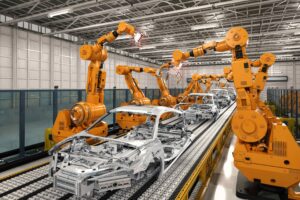DATA POINTS
- 94: The percentage of Americans expected to participate in Halloween activities this year
- 200: The maximum miles per hour of Hurricane Milton’s wind gusts
- 292: The percentage in increase of sold-out games in the WNBA this season compared to last
- 1,500: The number of mobilized troops sent to help with Hurricane Helene relief
- 1,525: The number of Spirit Halloweens opening this fall
- 8 million: The number of potential new voters aging into the 2024 election
Eyes on the Senate
All eyes have been on Donald Trump and Kamala Harris, but the presidency isn’t the only office up for grabs in November. With 34 out of 100 seats in the world’s most deliberative body hanging in the balance, these races will determine the political climate as much as the fight for the Oval. The Democratic Party currently controls the Senate – but its grip is tenuous at best (47 Democrats + 4 Independents that caucus with Ds vs. 49 Republicans). Montana, Nevada, Arizona, Texas, Wisconsin, Michigan, Ohio, and Pennsylvania are all potential tossups that could tip the scales of power.
In Montana, incumbent Democrat Sen. Jon Tester is facing Trump-endorsed Tim Sheehy. Ohio Democrat Sen. Sherrod Brown faces Republican challenger Bernie Moreno in the Trump-friendly Buckeye State. To the east, Pennsylvania Democrat Senator Bob Casey campaigns against Republican David McCormick, a former hedge fund manager. Abortion, inflation, and immigration are the race’s leading issues, and Casey is ahead in the polls. In Michigan, Democrat Rep. Elissa Slotkin and Republican former Rep. Mike Rogers are vying for an open seat; Cook Political Report has rated the race a toss up. Democrats have dominated Michigan Senate seats for decades, but Rogers held a competitive central Michigan house seat for 14 years.
Whether we are prepared or not, election season is here. The U.S. is only 25 days from deciding the country’s future.
 Call Will Smith, Robots are Taking Over
Call Will Smith, Robots are Taking Over
Tens of thousands of dockworkers returned to their jobs last week following a three-day strike that threatened many aspects of the U.S. economy. The workers received a 62% raise, a win for port laborers. But something more ominous sits waiting, posing a threat to their livelihoods – and millions of other jobs: Automation. From grocery store self-checkout lines, to manufacturing automobiles, to automated cranes moving shipping containers, robots are effective and don’t need a paycheck. The continual and rapid evolution of sophisticated machines, particularly in the age of AI, threaten workers of all calibers – even those who presumed they were originally safe from being replaced.
Automation proponents claim that if workers adapt to new roles, it will not reduce jobs – but simply change them. Opponents say positions like dockworkers are not equipped to serve as machine repairmen.
This is not a new conversation. For years, education, health services, professional and business services, and leisure jobs have worried about being overtaken by AI. If you’re entering the job market or looking for a career change, the U.S. Career Institute released a list of jobs least likely to be overtaken by AI and automation.
Read More at The Wall Street Journal
A new GOAT? 
Caitlin Clark’s first season in the WNBA has made history. The Indiana Fever rookie quickly became the face of the league, pulling in record crowds and TV ratings. Her jaw-dropping deep threes and behind-the-back assists dominated highlights, creating a fan base extending beyond Indiana and drawing thousands to arenas across the country.
Social media has also exploded with Clark highlights, with her team, the Fever, generating over 800 million views in just four months. Clark’s popularity dramatically increased the WNBA’s visibility, bringing in new fans and making her a household name. She’s been compared to NBA legends like LeBron James, who praised her for her talent and ability to handle the pressure of being a young star.
Is Clark’s impact on the WNBA rookie luck? Time will tell if she has the longevity of other basketball stars, but if the Caitlin Clark effect sticks, there’s no telling what she’ll accomplish for the league and the culture of women’s sports.
Americans are getting healthier
Amid the stress of politics, global issues, and economic uncertainty, here’s some good news: Americans are getting healthier. Life expectancy, which took a hit during the pandemic, is starting to bounce back. In 2022, the U.S. life expectancy rose to 77.5 years, higher than the 2021 rate of 76.4 years but lower than the pre-pandemic rate of 78.8 years. Drug overdose deaths, largely from opioids, are also declining thanks to the increased availability of naloxone and a general reduction in pandemic-related stress.
Cancer survival rates are rising, too. Today, about 70% of people diagnosed with cancer survive for at least five years, mainly due to advances in treatments.
Despite the encouraging changes, the U.S. still falls behind other countries in overall health. There is still progress to be made, but these improvements show positive change, one step at a time.
The Nonvoting Democracy
Prior to the 2020 election, 44% of Americans said they sometimes voted, 25% had never voted or only voted in one election, and only 30% said they vote in every election. More than 75 million eligible voters (U.S. citizens over 18) did not cast a ballot in 2020.
The demographic most likely to abstain from voting is young, not college educated, never married, has a low household income, and is a person of color.
What’s holding people back? For many, electoral apathy is too deep-rooted for candidates to convince them to head to the polls. With systemic problems often affecting individuals for their entire lives, they simply don’t see the point in a change of face in political office. Lines to cast a ballot can be cumbersome, especially during inclement weather. Some people cannot take the time off work, others miss the registration deadline, and some were not taught the process of voting.
Regardless of the outcomes of national elections, voting on local initiatives will determine how roads get fixed and how schools are funded. It is important that all Americans participate in the democratic process as much as possible.
Read More at The Associated Press
See you next week!
Be sure to follow us on Facebook, Twitter, and LinkedIn for more news and industry updates. To receive a copy of The Weekender in your inbox, sign up here.










